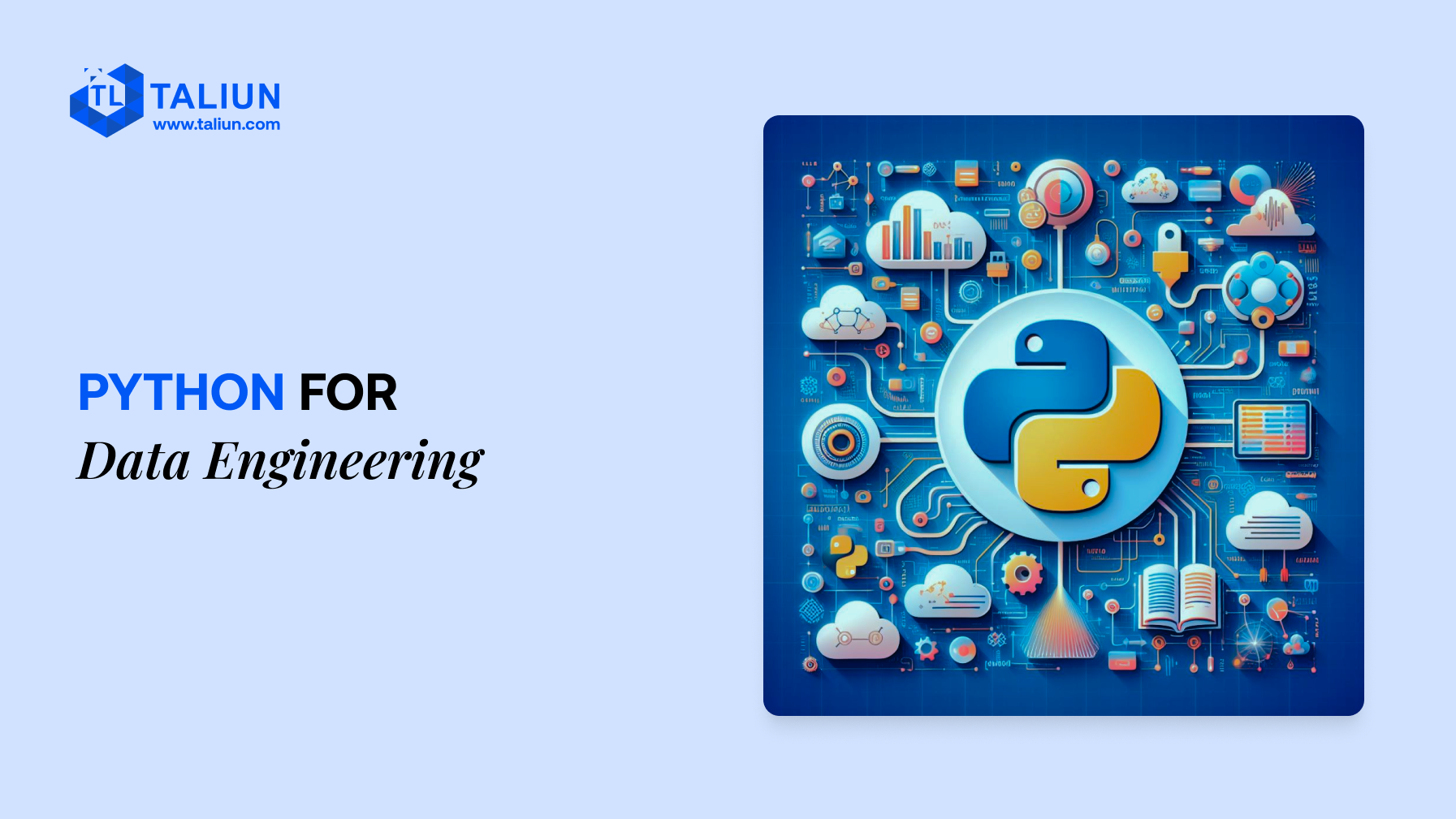Python for Data Engineering

The surge in data-intensive operations has positioned data engineering at the forefront of modern organizations. With the increasing demand for efficient data collection, processing, and storage, data engineers are turning to Python as their preferred tool. Its exceptional adaptability, user-friendly interface, and extensive array of specialized libraries make it an unparalleled choice in this field.
This article aims to uncover the rationale behind Python's dominance in data engineering. We'll examine its advantages, explore its practical applications, and underscore why Python is progressively becoming the go-to language for data engineers worldwide.
Why Choose Python for Data Engineering?
As the landscape of data engineering advances, the necessity for a versatile, high-performing, and easily accessible language becomes crucial. While various languages offer diverse functionalities, Python consistently stands out for meeting the distinct requirements of data engineers.
Let's dissect some of the key reasons that establish Python as the preferred language for tasks in data engineering:
1. Interpretive Nature
Python's interpretive nature eliminates the requirement for pre-compilation. This attribute significantly boosts development speed, enabling data engineers to swiftly write and test scripts. This fosters an iterative and agile approach to handling data operations.
Immediate Execution: Python code directly runs through the interpreter, eliminating the need for a separate compilation step. This enables developers to write, test, and debug code more rapidly.
Platform Independence: Python code typically runs on different platforms with the aid of an interpreter, following the principle of "Write once, run anywhere.
Dynamic Typing: Python's runtime variable checking allows for flexible and dynamic types, expediting initial development.
Quick Iteration: Python's prompt feedback empowers developers to efficiently experiment and adapt their approaches, which is crucial for data engineers refining processing techniques.
Streamlined Development Cycle: The absence of compilation reduces the gap between code writing and execution, enhancing the overall efficiency of the development process.
2. Vast Libraries and Packages
Python boasts an extensive range of libraries and packages, offering solutions for nearly every requirement. This means data engineers can avoid reinventing the wheel by utilizing code that's already available.
Data-Centric Libraries: Python houses specialized libraries like Pandas, NumPy, and Scikit-learn, specifically crafted for data manipulation, analysis, and machine learning. These streamline the workflows of data engineers.
Plug-and-Play: Many of these libraries seamlessly integrate with one another, diminishing development time and enhancing compatibility across various tasks.
3. High Performance
Python inherently offers efficiency and robustness, empowering data engineers to manage substantial datasets effortlessly:
Speed & Reliability: Python's core design prioritizes rapid handling of large datasets, making it well-suited for data-intensive tasks.
Integration with Spark: Pairing Python with platforms like Spark enhances its performance further. For example, PySpark optimizes distributed data operations across clusters, ensuring accelerated data processing.
Extensibility: Python seamlessly integrates with C or C++ for tasks requiring additional performance enhancements, showcasing its versatility in tackling diverse computational challenges.
4. Broad Adoption and Extensive Support
Python's widespread acceptance and strong support within the tech community bring several advantages:
Abundance of Online Resources: Python's popularity ensures a wealth of online tutorials, forums, and documentation. This abundance facilitates easy access to solutions for common issues or existing code snippets, smoothing the development process.
Active Community: The thriving Python community continuously contributes to its evolution, guaranteeing the language's relevance and ongoing updates.
In summary, Python's amalgamation of simplicity, potency, and robust support makes it an enticing choice for data engineering. Whether initiating a new project or integrating with existing systems, Python equips engineers with the necessary tools and community support for ensuring success.
FAQ’s
How Much Python Knowledge Does a Data Engineer Need?
The role of a data engineer is multifaceted, adapting to project needs and the ever-evolving tech landscape. However, Python remains a cornerstone in this domain. Yet, the question arises: what level of proficiency in Python is essential for a data engineer?
It's not merely about grasping the basics; rather, it's about comprehending Python's extensive ecosystem. Being familiar with specialized libraries like Pandas for data manipulation or Dask for distributed computing can prove immensely valuable.
Beyond technical prowess, Python's emphasis on readability and simplicity is noteworthy. These principles aid data engineers in crafting more maintainable and collaborative code. Especially in dynamic teams involving multiple stakeholders interacting with code or data pipelines, readability becomes increasingly crucial.
In essence, both aspiring and seasoned data engineers require a substantial depth of Python knowledge. It involves mastering the language, embracing its ecosystem, and adopting its philosophy. However, it also entails leveraging Python as part of a broader skill set, ensuring a comprehensive approach to data engineering.
Know more about
Python Software Development Services
Subscribe to our Blogs
Contact Us
Thanks for subscribing! You'll now receive our latest blog posts straight to your inbox.
Please try again later.
Locations
US:
39899 Balentine Drive,Suite 200
Newark, CA 94560
Phone: +1-(408) 883 - 7902
India:
Ven Business Center I, First Floor, Baner - Pashan Link Rd, Pashan, Pune, Maharashtra 411021
Phone: +91 - 20 6723 6382
Copyright 2024 Taliun | Privacy Policy




